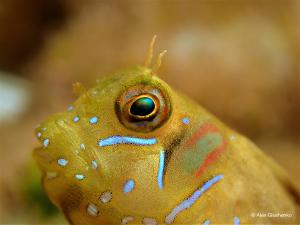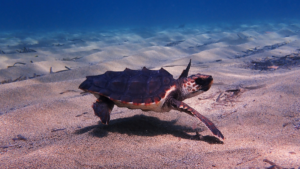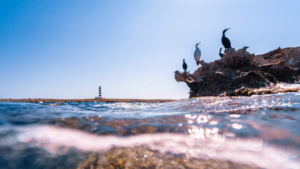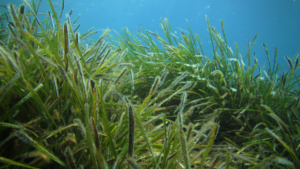
PROTECT OUR MARINE ENVIRONMENTS
“We aim to have 30% of Menorcan waters studied, protected and managed by 2030”

Menorca was declared a Biosphere Reserve in 1993 by UNESCO. On 19th June 2019, UNESCO approved the extension of its limits incorporating the entire marine area that surrounds the island from the coast, up to 12 nautical miles offshore. This way, Menorca became the largest Marine Biosphere Reserve in the Mediterranean, going from 71,191 hectares to the current 514,485. To date, although 61% of the waters within the Biosphere reserve limits are under some form of protection, only 1.7% is actually protected and managed–this percentage was slightly increased with the creation of the Isla del Aire Marine Reserve (RMIA) in 2019*, which Menorca Preservation, with Blue Marine’s help was able to support.
“No Water, No Life. No Blue, No Green” – Dr. Sylvia Earle
For this reason, we have aligned our goals with the High Seas Treaty agreed by the UN, which proposes that 30% of the seas should be under protected areas by 2030. Therefore, we aim to increase this 1.7% in order to achieve that 30% of Menorcan waters are effectively studied, protected and managed by 2030.
*Source: Socio-environmental Observatory of Menorca (OBSAM)
The environmental problem
The over-plasticisation of food in supermarkets, the abuse of single-use products by the Hospitality sector and low recycling rates have led to our coasts and beautiful environments being littered with plastic waste. According to the “Balearic Sea Report 2021” by the Marilles Foundation, 45% of the marine species studied had ingested microplastics. The current Law 8/2019 of waste and contaminated soils of the Balearic Islands was promoted to encourage sustainable waste management and curb the use of single-use products in the Hospitality sector, however, to date none of the businesses that have gone through the “plastic free” certification process carried out by our “Plastic Free Menorca Alliance” initiative have complied with the law, mainly due to lack of understanding of it. Additionally, the lack of resources allocated to the study of our marine environments leads to a lack of efficiency in the management plans developed to protect them. Moreover, the lack of surveillance of illegal practices such as illegal anchoring or illegal fishing increases the vulnerability of the species living in these precious environments.
The challenges facing our marine environments
Our marine environments face critical environmental challenges:
- Major pollution crisis from plastics and other debris harmful to the sea.
- Lack of scientific knowledge about the state of our environments for the development of effective and efficient management plans.
- Lack of environmental awareness among the population.
- Overexploitation of marine resources due to illegal fishing.

OUR MISSION:
We will work towards the creation of a Marine Conservation Strategy for Menorca. The initial steps of which, are the development of a Participative Governance project for the Isla del Aire Marine Reserve, which aims to increase the knowledge of the real benefits that a Marine Reserve represents for the surrounding community, in order to improve its management, protection and surveillance. Once the project is underway, the goal would be to use it as a pilot project to potentially replicate and expand to other protected areas around the island.
In order to continue improving the levels of biodiversity and conservation of endemic species, we will continue to support vital projects to monitor and restore our environments, such as the “Evaluation of the fish populations vulnerable to fishing in Menorca’s coastal waters”, the “Monitoring of Posidonia meadows Study”, and “Shallow bay conservation and restoration” projects, carried out by OBSAM-IME and collaborating entities. In parallel, we will continue to support sustainable fishing and to increase responsible consumption of local fish through our Calant Xarxes project in collaboration with Mallorca and Ibiza Preservation, the Conservation Collective, Blue Marine Foundation and Marilles Foundation.
Finally, we will continue to support environmental initiatives aimed at bringing society closer to the sea through active participation such as the 0 Plastic Diving Expeditions, along with continuing to work on reducing marine waste by supporting our beach cleaning days or the Plastic Free Balearic certification which aims to effectively remove single-use plastic from the hospitality sector, all carried out by our Plastic Free Menorca Alliance.
OUR GOALS:
- The creation of a Marine Conservation Strategy for Menorca.
- Improved levels of biodiversity and conservation of endemic species via Marine Research and Restoration activities.
- Bring society closer to the sea through education and active participation.
- Support sustainable fishing and increase the responsible consumption of local fish.
- Reducing marine waste.
OUR EXPECTED OUTCOMES:
- Increase in the percentage of protected areas.
- Biodiversity improvement: monitoring fish populations vulnerable to fishing and Posidonia meadows.
- Increase the number of businesses certified as “Plastic Free” via our Plastic Free Menorca Alliance.
- Support environmental awareness initiatives.
OUR IMPACT:
Since 2017 Menorca Preservation has developed several projects focused on our Sea Pillar, through which we have achieved:
- Over 50 businesses certified through our “Plastic Free” certifications and over 128,000 single-use products effectively removed from these establishments.
- Over 1,000 children with greater awareness of plastic pollution and increased appreciation for our marine environments.
- 400kgs of plastic waste and 7,700 microplastics removed from our environments.
- 54,300 plastic bottles (0,50cl) saved via our “Plastic Free Menorca” filtered fountains.
- 2,100 kgs of discarded fishing nets collected via our “PescArt Menorca” circular economy project.
- Supported Tursiops Association in the identification of a “Sperm Whale breeding area” in waters to the north of Menorca.
- Supported the creation of the Isla del Aire Marine Reserve, which since its declaration in 2019 has shown a significant increase of the biomass (fish size) and abundance (number of specimens).
- Developed a 4-year Action Plan for a Participative Governance for the Isla del Aire Marine Reserve.
Awards for our “PLASTIC FREE MENORCA” work during 2023:
